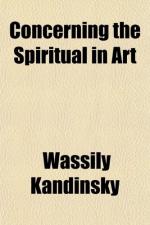[Footnote: Frequent use is made here of the terms “material” and “non-material,” and of the intermediate phrases “more” or “less material.” Is everything material? or is everything spiritual? Can the distinctions we make between matter and spirit be nothing but relative modifications of one or the other? Thought which, although a product of the spirit, can be defined with positive science, is matter, but of fine and not coarse substance. Is whatever cannot be touched with the hand, spiritual? The discussion lies beyond the scope of this little book; all that matters here is that the boundaries drawn should not be too definite.]
If the emotional power of the artist can overwhelm the “how?” and can give free scope to his finer feelings, then art is on the crest of the road by which she will not fail later on to find the “what” she has lost, the “what” which will show the way to the spiritual food of the newly awakened spiritual life. This “what?” will no longer be the material, objective “what” of the former period, but the internal truth of art, the soul without which the body (i.e. the “how”) can never be healthy, whether in an individual or in a whole people.
This “What” Is the internal truth which only art can divine, which only art can express by those means of expression which are hers alone.
III. SPIRITUAL REVOLUTION
The spiritual triangle moves slowly onwards and upwards. Today one of the largest of the lower segments has reached the point of using the first battle cry of the materialist creed. The dwellers in this segment group themselves round various banners in religion. They call themselves Jews, Catholics, Protestants, etc. But they are really atheists, and this a few either of the boldest or the narrowest openly avow. “Heaven is empty,” “God is dead.” In politics these people are democrats and republicans. The fear, horror and hatred which yesterday they felt for these political creeds they now direct against anarchism, of which they know nothing but its much dreaded name.
In economics these people are Socialists. They make sharp the sword of justice with which to slay the hydra of capitalism and to hew off the head of evil.
Because the inhabitants of this great segment of the triangle have never solved any problem independently, but are dragged as it were in a cart by those the noblest of their fellowmen who have sacrificed themselves, they know nothing of the vital impulse of life which they regard always vaguely from a great distance. They rate this impulse lightly, putting their trust in purposeless theory and in the working of some logical method.
The men of the segment next below are dragged slowly higher, blindly, by those just described. But they cling to their old position, full of dread of the unknown and of betrayal. The higher segments are not only blind atheists but can justify their godlessness with strange words; for example, those of Virchow—so unworthy of a learned man—“I have dissected many corpses, but never yet discovered a soul in any of them.”




